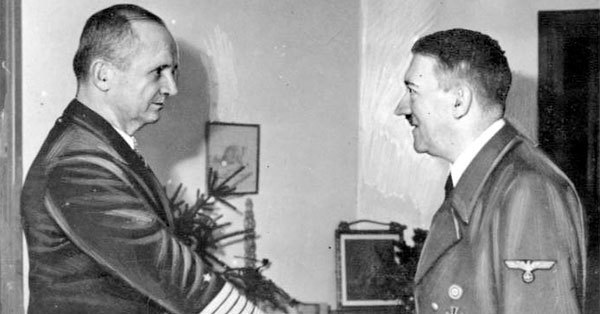Karl Donitz was born on September 16, 1891, the second son of Anna Beyer and Emil Donitz, an engineer. In 1910, Donitz enlisted in the Kaiserliche Marine or German Imperial Navy, a career that lasted 35 years. During those years, Donitz was a husband, father, prisoner of war, master strategist and the man who built the greatest submarine navy in the world. He never joined the Nazi party but managed to impress Hitler sufficiently to be named the Fuhrer’s successor. He ended his career as not only Admiral but also the last Fuhrer of the Third Reich.

The Wolfpack Method
In 1913, Donitz’ received his first commission as an acting sub-lieutenant. Just one year later, he was experiencing real action when the First World War broke out. For the first two years of the war, Donitz served on battle cruisers. But in 1916, after he was promoted to Oberleutnant, Donitz was asked to transfer to submarines. For the next two years, he served as a sub-commander in the Mediterranean- until months before the end of the war, his craft was sunk and he and the rest of his crew were taken prisoner in Malta.
Donitz was transferred to a POW camp near Sheffield in the UK. Despite the fact the war ended soon afterward, he was not released until July 1919. However, while imprisoned, Donitz used his time wisely. He began to consider the best way for U-boats to take down enemy ships. Donitz concluded it was best for several U-boats to lie in wait. When a boat spotted a convoy, they were to radio the other ships so they could gather together -like a wolf pack. The wolf pack would allow the ships to pass. Then they would strike.
Donitz did not have the chance to test his theory until war broke out again in 1939. He became convinced that German success depended on a campaign against the British merchant fleet. Oil tankers were a prime target, as cutting the oil supplies would severely handicap the Royal Navy. By now, high-frequency transmitters meant that the allies could not jam the German’s radios. If the U-boats stayed close to the surface and attacked under the cover of night, they could not be seen or detected by sonar.
Donitz began to petition for the German fleet to be converted into U-boats. He believed that 300 VII U-boats were sufficient to defeat Britain. Donitz faced stiff resistance from other commanders. But in the end, he convinced them. He began to train sub crews in wolfpack tactic and employ all the technology at his command. By the end of the war, despite the nation’s defeat, Germany had the most advanced submarine fleet in the world- thanks to Karl Donitz.

